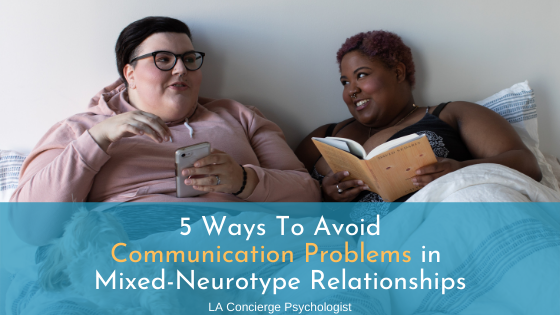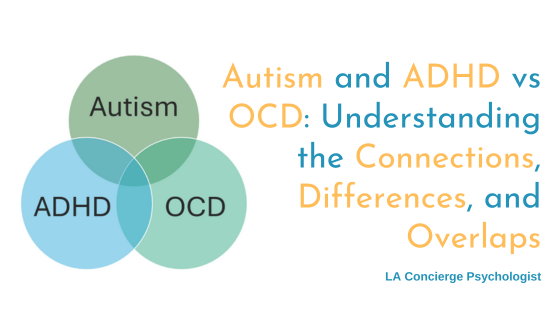Part of our work as adult autism therapists is to help our clients navigate the ups and downs of romantic relationships. In many cases, our clients are in a mixed-neurotype relationship (an autistic person dating or married to someone who isn’t). Communication problems are one of the most common issues we see in these instances because of the double-empathy problem.
As you may have noticed, many things can go wrong when you’re trying to communicate with your date or partner. That’s why it’s so important to cultivate the five values of healthy communication—self-awareness, reciprocity, honesty, compassion, and open-mindedness—that we introduced last month.
Working with an experienced autism therapist can help you cultivate these values more quickly than you could alone. In either case, though, you can’t expect to master them overnight. In the meantime, we’d like to offer you a few strategies you can use right away to avoid communication problems related to your adult autism. Whether you’re in conflict with someone you’re dating or you’re having marriage problems with your spouse, the following tips can help you achieve healthier communication:
Five autism communication strategies for adults
1. Be clear
Communication is surprisingly prone to errors. Even if you think you know what your partner is thinking, you may be misinterpreting their words and actions. Instead of making assumptions about your partner, we recommend seeking confirmation about anything that is unclear.
For example, if you think your partner is implying something, ask for confirmation. “Are you saying X?” Many neurotypical people think abstractly, use sarcasm, or phrase things differently when they’re trying to be polite. Even when neurotypical people try to be clear, they sometimes phrase things in a way that’s open to interpretation or prone to misunderstand. It’s not your fault if you can’t understand your partner when they do this. However, it is your responsibility to request clarification whenever you’re unsure about something.
It’s also essential that you be clear and specific about what you want and feel. Your needs may seem obvious to you, but they may be invisible to your partner. By communicating them calmly and patiently, you’ll make it possible for your partner to understand and respect your needs.
2. Focus on the solution, not the problem
Imagine the following scenario: You have become increasingly frustrated with your partner for repeatedly showing up late for dates. Your impatience continues to grow until one day, your frustration comes out all at once. You angrily ask your partner, “Why do you always show up late?!”
Even though your accusation may be factually accurate, it focuses on the problem rather than the solution. It puts your partner on the defensive, and, as a result, they might deny it or dismiss it as inconsequential. From their point of view, you attacked them, so they defend themselves.
Now imagine that you phrase your grievance in terms of looking for a solution, instead: “I’m excited to go to dinner with you, but we lost our reservation because you arrived so much later than you said you would. How could we prevent this from happening next time? I know you sometimes work late, so maybe we could schedule our dates later in the evening, or perhaps on weekend nights?”
With this problem-solving-oriented approach, you minimize defensiveness in your partner and make it more likely they will join you in your search for a solution. Remember, you want it to feel like you and your partner are fighting against a problem, not each other.
3. Assume the best
There may be times when it feels like your partner is trying to be difficult, but that’s likely untrue. It’s much more likely that your partner simply has no idea how much their behavior is bothering you. They are probably already putting in some effort to make the relationship work, even if that effort is invisible to you.
Instead of assuming the worst when your partner does something annoying, recognize that they must have their own reasons for doing things the way they do. These reasons might not have anything to do with you, so until you find out differently, it’s best to assume your partner’s motives are either neutral or perhaps even positive toward you.
For example, imagine that your partner has pressured you to come along to every single social outing they’ve been invited to recently. If you assume the worst, you might imagine they have no respect for your need for lots of quiet time. But maybe they just want to make sure you feel loved and included in their life. By assuming the best, you can set a positive tone for your conversation: “I appreciate your kindness in always trying to include me. I’m flattered you would want me along. But I prefer to spend most evenings at home so I can recharge from the workday.”
4. Cultivate closeness
If you and your partner have been arguing a lot, you’re probably not feeling particularly warm and fuzzy toward each other right now. There may be resentment, anger, and other hurt feelings that make it hard to communicate calmly and compassionately.
To help rebuild a sense of closeness, we recommend you and your partner make an effort to do things that rebuild positive feelings between you. There are a variety of things, big or small, that you could do. You might set aside time for a morning coffee catch-up or a weekly date night. Perhaps you could do something simple like leave your partner a note in their lunchbox. Or, if you don’t live together, text them every evening to see how their day went.
Plan get-togethers that are calming and enjoyable for both of you. Rather than going out to a loud restaurant, for example, you could do something like a picnic in the park or a funny movie at home. You might be more comfortable doing something where you don’t have to maintain constant eye contact. So you might enjoy something like a walk, crafting night, or going to a museum.
5. Start small
If you’re reading this blog post, there may be some things you’re eager to talk about with your partner. Maybe they’ve been doing something that really bothers you, or there’s an important conversation you need to have about your life together.
As eager as you may be to tackle significant issues, we recommend you practice your skills on smaller problems first. The skills you learn from blog posts like this one won’t always work as perfectly in real life as they do on paper; your unique situation may call for a different approach. There may also be some things you need to learn about your partner or yourself before you can navigate sensitive topics successfully.
Once you’re communicating openly about small things, bigger issues will seem less intimidating. After all, many issues that seem big are really just an accumulation of smaller issues that can be dealt with individually.
Support Your Mixed Neurotype Relationship
By taking the points above into consideration, differences in autism and neurotypical communication won’t ruin your romantic relationships. If you find that you need some support in taking these ideas from theory to practice, consider working with one of our autism specialists. Send us a message or book a free 20 minute consultation call with Dr. Barajas or Dr. Goldman.




